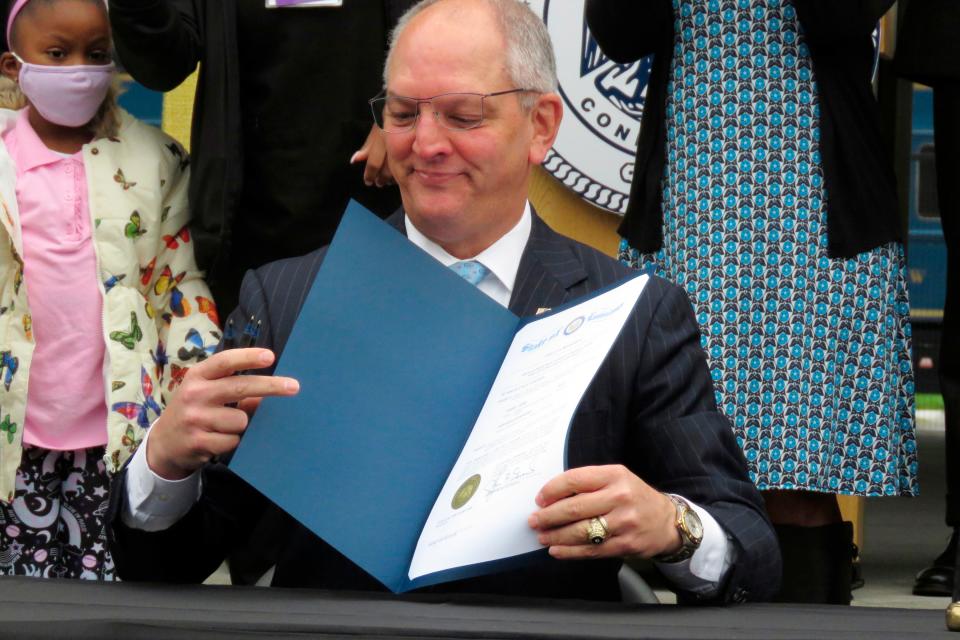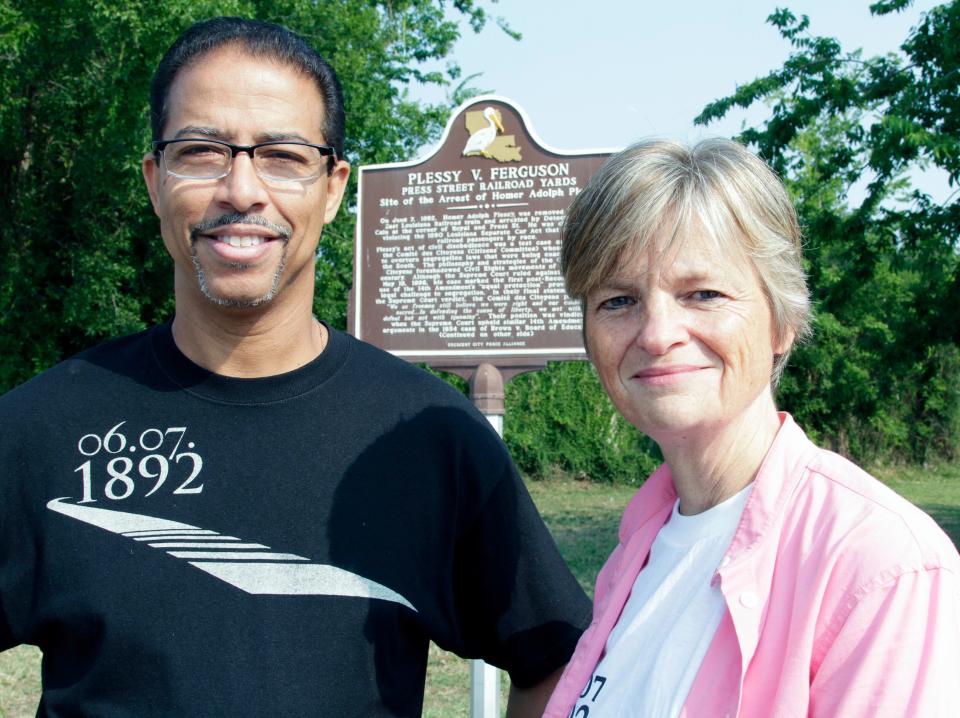Homer Plessy, of 'separate but equal' ruling, pardoned for riding whites-only train in 1892
- Oops!Something went wrong.Please try again later.
- Oops!Something went wrong.Please try again later.
NEW ORLEANS – Homer Plessy's name was cleared Wednesday more than a century after his ejection from a whites-only train triggered the "separate but equal" Supreme Court ruling that institutionalized racism in America for decades.
Louisiana Gov. John Bel Edwards granted the pardon for what he called an "unjust criminal conviction" during a ceremony near the site of the arrest that was attended by relatives of Plessy and John Ferguson, the judge who handled the original case.
"The stroke of my pen on this pardon, while momentous, it doesn't erase generations of pain and discrimination. It doesn't eradicate all the wrongs brought by the Plessy court or fix all of our present challenges," Edwards said. "But this pardon is a step in the right direction."
The governor’s office said this was the first pardon under Louisiana’s 2006 Avery Alexander Act, which allows people to be pardoned who were convicted under laws that were intended to discriminate. The state pardon board in November unanimously recommended the pardon at the request of both Plessy and Ferguson's families.

"I just feel gratitude for my ancestor who stood up and set an example for generations of civil rights activists who would follow him," said Keith Plessy, a cousin of Homer Plessy, in an interview with USA TODAY Network.
"Sometimes I don't feel like my feet are on the ground because my ancestors are carrying me," he said. "I'm holding back tears because I'm too happy to cry."
Phoebe Ferguson, a descendant of the judge who ruled against Plessy, said the pardon "feels like a new dawn for civil rights."
"This doesn't erase the wrong," Ferguson said. "We can't undo the wrongs of the past, but we can learn from them and keep them from happening in the future."

More: Claudette Colvin's 1955 arrest record for refusing to give up bus seat to white person expunged
Although the Civil Rights Act of 1866 granted anyone born in the United States the same rights as white Americans, including freed slaves, Southern states including Louisiana began enacting "Black Codes" that restricted the places Black Americans could work, travel and eat as Reconstruction failed.
Plessy, a light-skinned Black shoemaker, decided to deliberately violate Louisiana's Separate Car Act, which mandated that Black and white people sit separately, in an attempt to get the law overturned. He was arrested for refusing to move, pleaded not guilty and appealed his case to the Supreme Court.
The landmark 1896 decision, Plessy v. Ferguson, institutionalized racism across the United States and "led to generations of inequity and left a stain on the fabric of our country and on the state and on the city," Edwards said.
"If one race be inferior to the other socially, the Constitution of the United States cannot put them upon the same plane," the court said at the time.
'It's long overdue': Board recommends pardon for Homer Plessy
Plessy pleaded guilty in 1897 and was fined $25; he died in 1925. The case was part of what drove activists to form the NAACP in 1909 and inspired Rosa Parks to refuse to give up her seat on a segregated public bus in Montgomery, Alabama, in 1955.
The Supreme Court decision wasn't overturned until 1954 when a different group of justices ruled in Brown v. Board of Education of Topeka, Kansas. Discrimination based on race, sex, color and more protected characteristics was officially prohibited with the Civil Rights Act of 1964.
On Wednesday, New York cellist Kate Dillingham – the great-great-granddaughter of U.S. Supreme Court Justice John Hareland Marshall Harlan, the only dissenting judge in the ruling – opened the ceremony at the New Orleans Center for Creative Arts by performing "Lift Every Voice and Sing."
"It's a very emotional, very important thing we're doing today and long overdue," said Dillingham, who chose the song because "it felt like an appropriate hymn" for the occasion.
Contributing: Deborah Barfield Berry and Trevor Hughes, USA TODAY; The Associated Press.
Greg Hilburn covers state politics for the USA TODAY Network of Louisiana. Follow him on Twitter at @GregHilburn1. N'dea Yancey-Bragg covers race and diversity issues for USA TODAY. Follow her on Twitter at @NdeaYanceyBragg.
This article originally appeared on USA TODAY: Homer Plessy of 'separate but equal ruling' pardoned by La. governor

